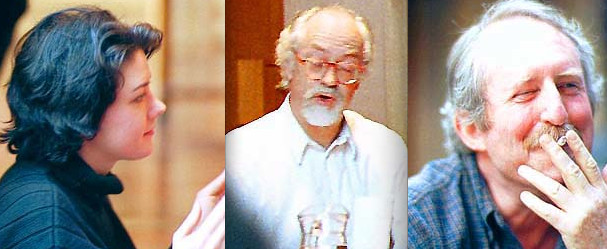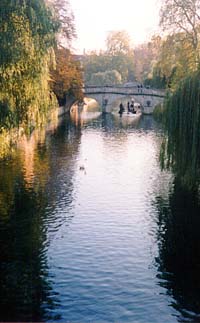
Bernardo Soares on the Cambridge Conference of Contemporary Poetry, 1998
From Jacket #4 (1998)

How shall I articulate with what I hear? Not indulge an emotional reaction prompted in me nor assert the conceptual “grasp” which actually is a standing-back and leads to adopting a position, a self-testing consciousness which demeans its occasion. One way to engage is interlock through metaphor, but this too preens into consistency.
I shall resist the bad faith of consistency, or so I mused in closing down my applications, bestowing a good-weekend smile on my secretary, checking travelcard present and leaving an unprecedented twelve minutes before habitual time of departure. Yes, to resist consistency, but refrain too from flattering reality by granting it the variety it claims so flagrantly. I am open! I receive all tendencies! Set aside your received ideas! This is the CCCP embrace; but I who idled six years on the Cam's banks permit myself a weary smile. Nothing over-pronounced.
For the heterogeneity itself represents a reassuring consistency — the consistency of CCCP. But the middle-aged are sensitive to change in old haunts, and this year change was discernible. Had the animadversions of Messrs Evans and Moxley in their admirable Dictionary of Received Ideas drawn a little blood? There were signs of organisation — frustrated gestures perhaps; but starting with a little brochure of considered design and for Cambridge improvident with information.
It was therefore with something approaching (but certainly not bearding) confidence that I approached the Chetwynd Room at Kings College, mis-en-scène of the weekend's entertainment, via the only student bar in Cambridge where young women of fashion may be noticed. Later I was to be introduced to one seeming carved from alabaster and in clothes so undisturbable that I was not surprised to learn she was a philosopher.
 The Chetwynd Room is two rooms, the anteroom this year detaining the confederates at both the bookstall presided over by Mr Peter Riley (who resembles a Victorian genre painting of “The Antiquary”) and more remarkably at an exhibition of Mr Tom Raworth's lifetime achievements in poetry, design, printing, publishing and collage - housed in museum exhibition cases of formidable scale and labelled as eruditely as any collection of Roman oil lamps. This exhibition marked the great and greatly loved poet's sixtieth birthday, and aptly. It was accompanied by a commendable catalogue including an academic essay culled from Mr Simon Perill's doctoral thesis, and an introductory note and cod biography of the poet distinguished by a wit which brings to mind a bullpit terrier executing an immaculate pas ciseaux. Additionally there was a commemorative card featuring poetic works by Messrs Ward and Wilkinson and distorted likenesses of the poet. Enough! Our subject should properly be the ephemeral, the performative.
The Chetwynd Room is two rooms, the anteroom this year detaining the confederates at both the bookstall presided over by Mr Peter Riley (who resembles a Victorian genre painting of “The Antiquary”) and more remarkably at an exhibition of Mr Tom Raworth's lifetime achievements in poetry, design, printing, publishing and collage - housed in museum exhibition cases of formidable scale and labelled as eruditely as any collection of Roman oil lamps. This exhibition marked the great and greatly loved poet's sixtieth birthday, and aptly. It was accompanied by a commendable catalogue including an academic essay culled from Mr Simon Perill's doctoral thesis, and an introductory note and cod biography of the poet distinguished by a wit which brings to mind a bullpit terrier executing an immaculate pas ciseaux. Additionally there was a commemorative card featuring poetic works by Messrs Ward and Wilkinson and distorted likenesses of the poet. Enough! Our subject should properly be the ephemeral, the performative.
For the benefit of the antipodean or the Mancunian, I should note that the Cambridge Conference of Contemporary Poetry is not a conference. This does not make it two conferences as the Chetwynd room is two rooms; it is a conference accidentally, being actually a sequence of poetry readings. Since English poetic culture has yet — I observe — to be compromised by the prospect of academic tenure which makes Usanian poets shy at an alcoholic beverage, conferring takes place as a by-product of 1) drinking, 2) the absence of Mr Stephen Rodefer and 3) the presence of Mr Ben Watson and Mr Andrew Duncan.
[Read the entire article.]